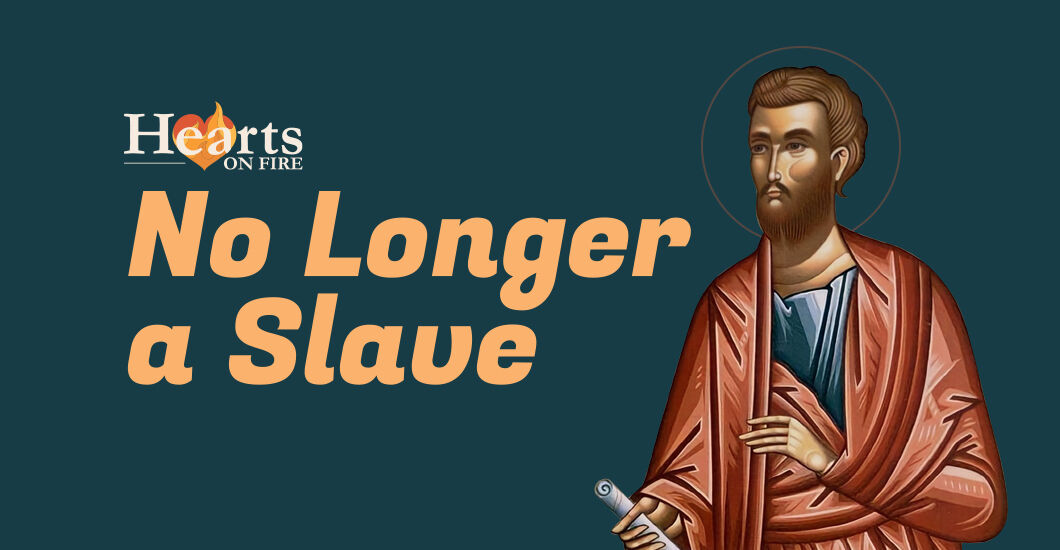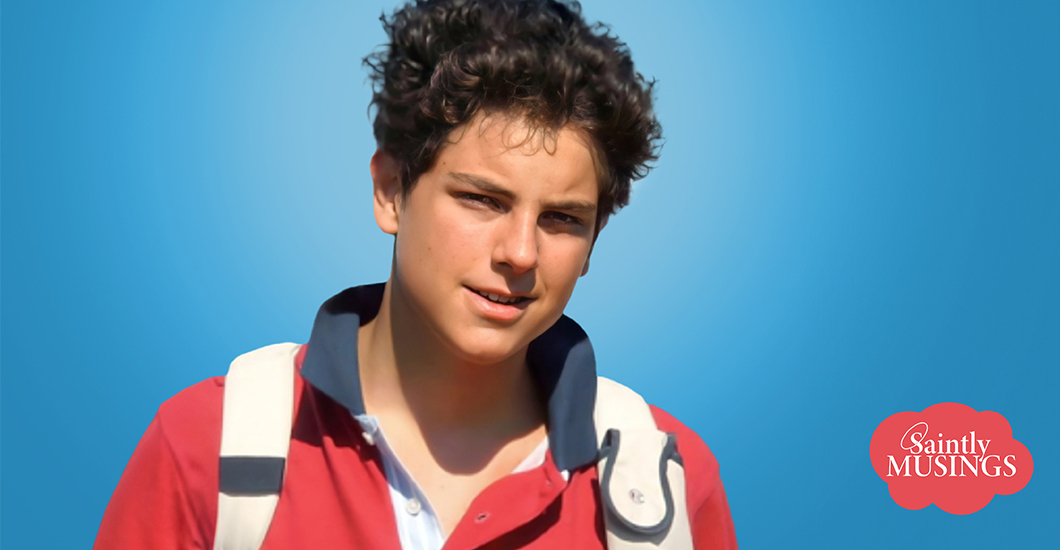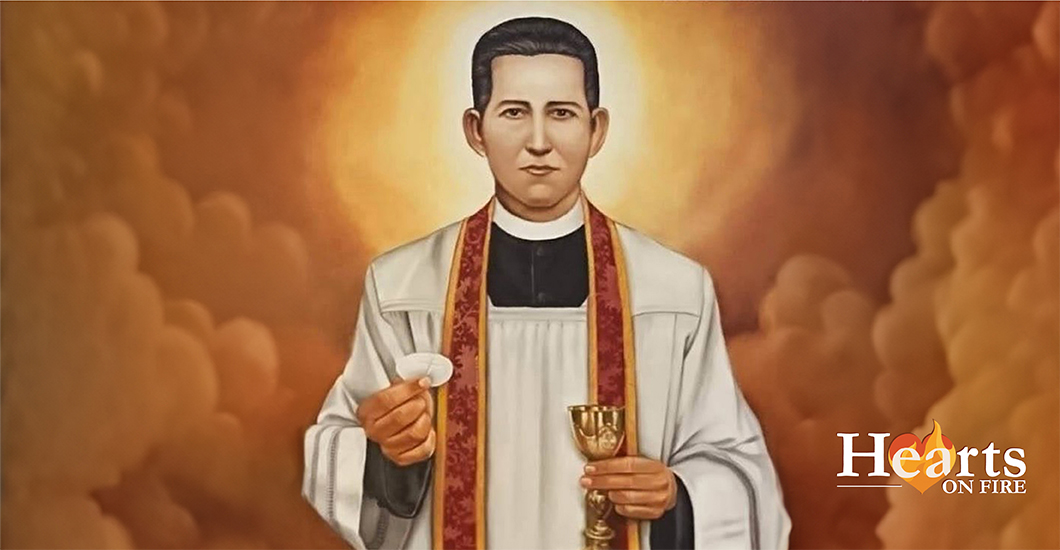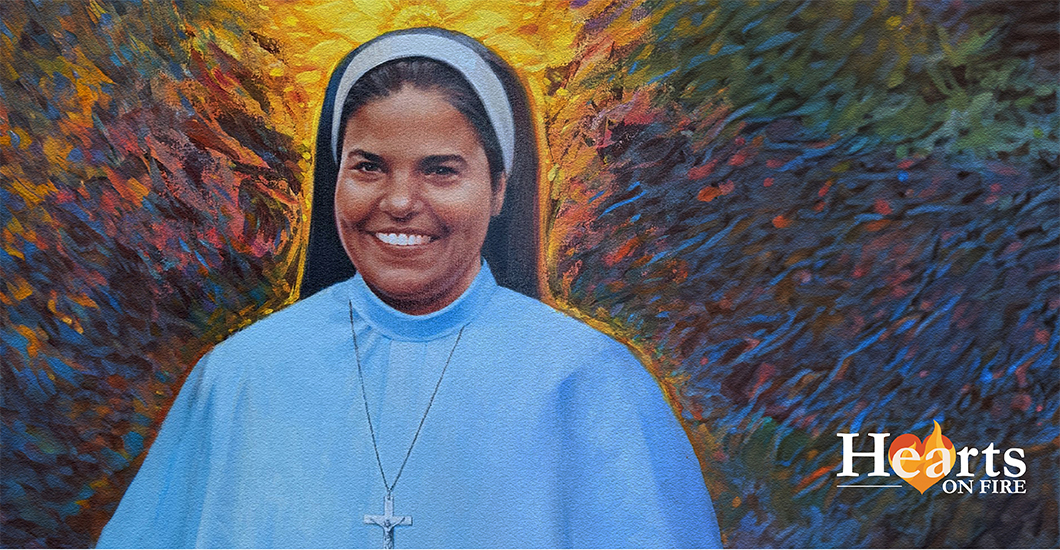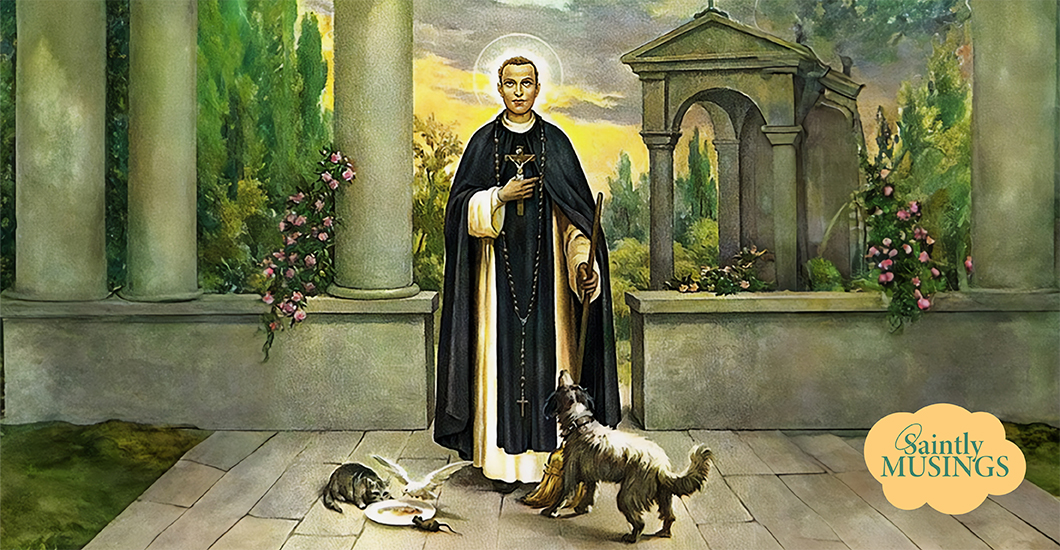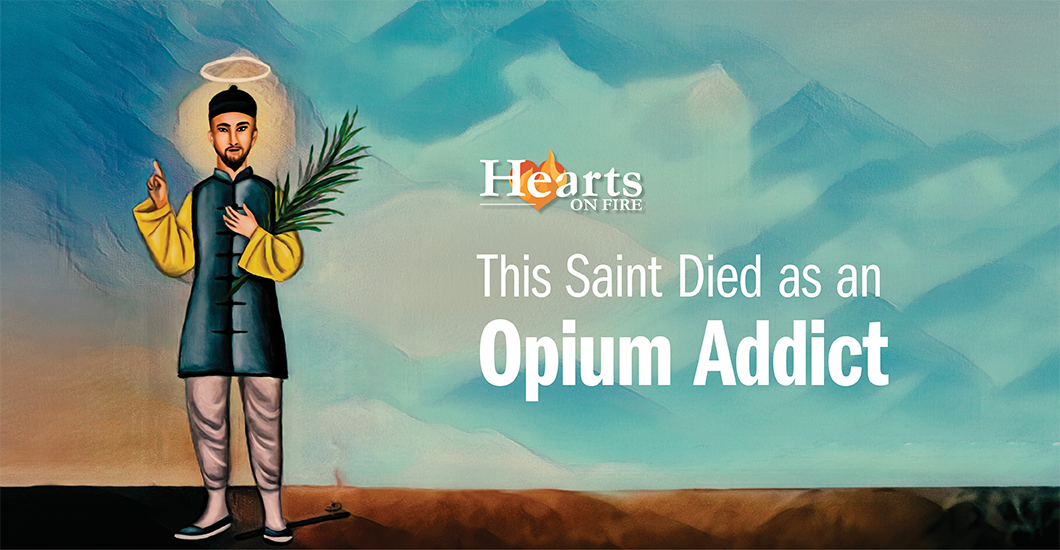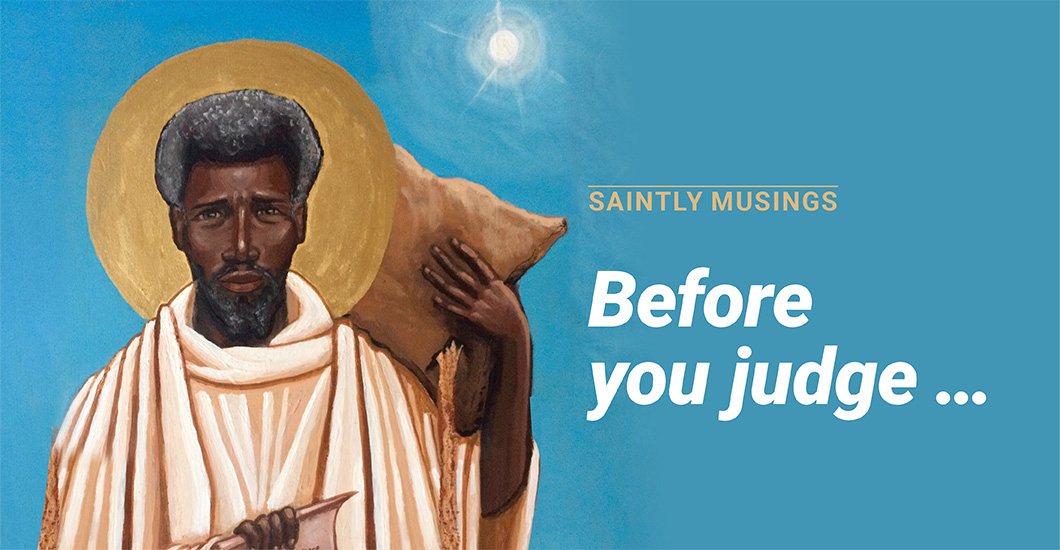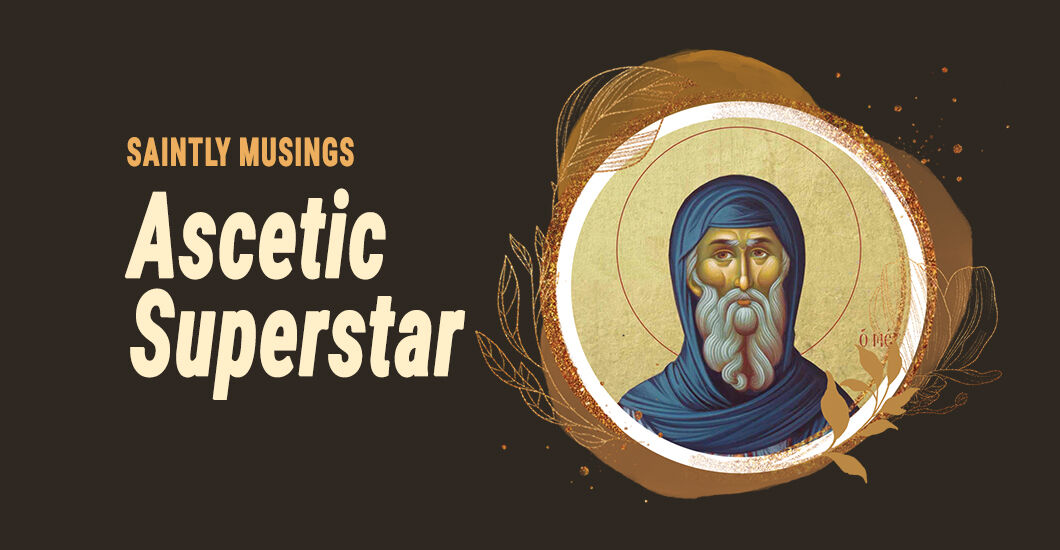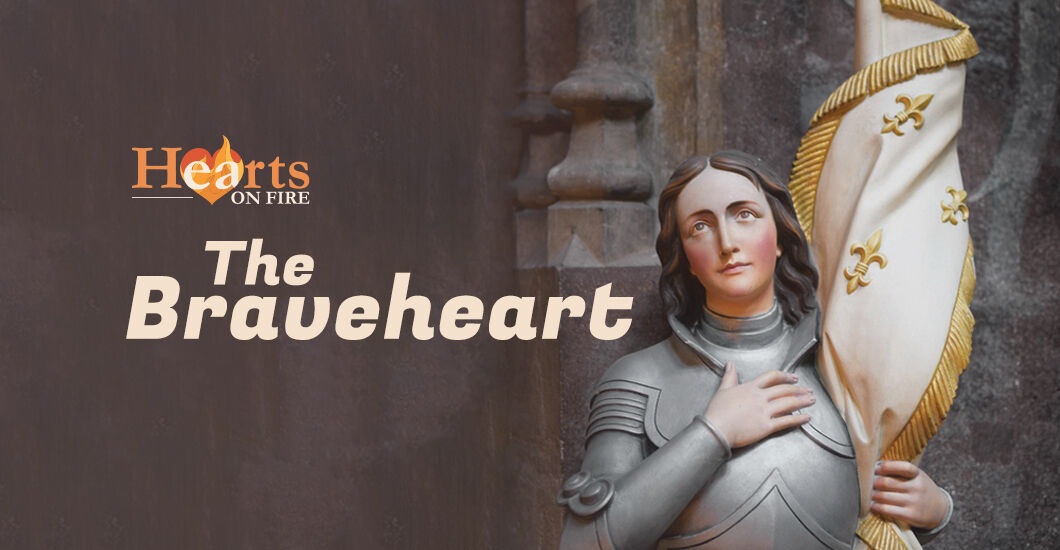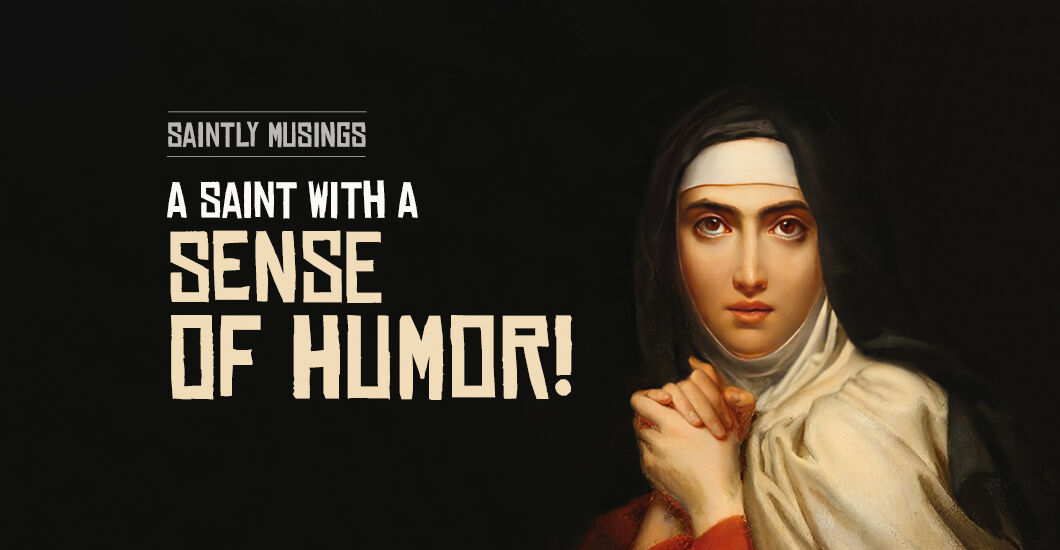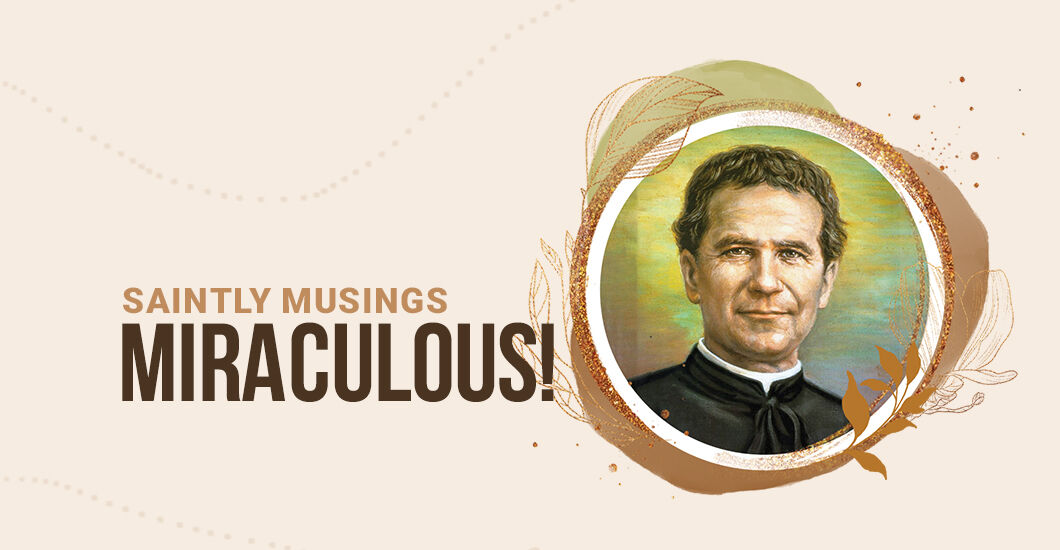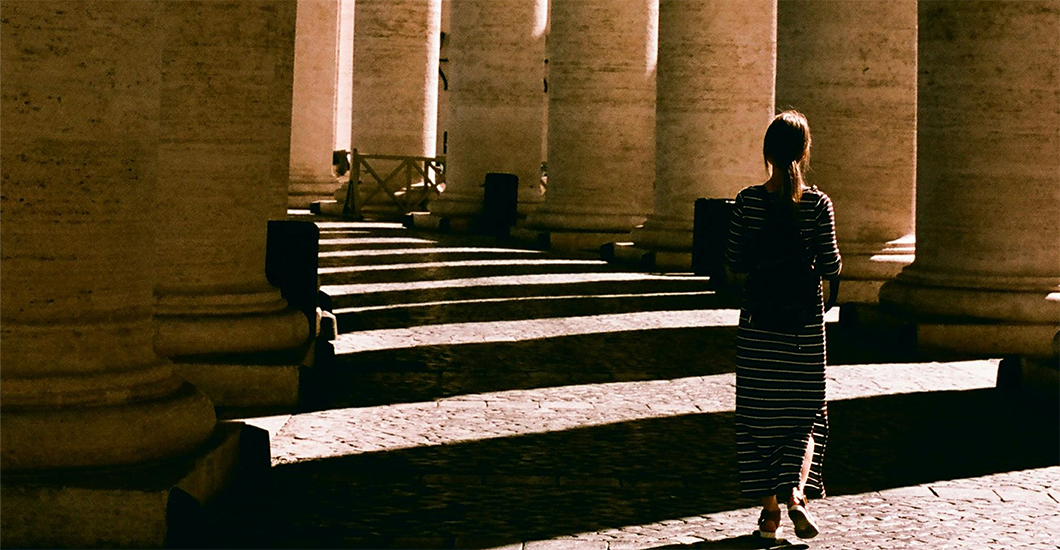Home/Evangelize/Article
Trending Articles
No Longer a Slave
Have you heard of Onesimus about whom Saint Paul wrote the shortest “book” in the Bible?
A Phrygian by birth, Onesimus was a slave to Philemon, an influential member of the Christian community. Philemon had been instructed in the faith and baptized by Saint Paul, who has become his friend and mentor. We lack definite details, but we know that the slave Onesimus had run away from his master—perhaps taking with him some wealth that wasn’t his. At some point after his escape, Onesimus meets Saint Paul in the city where Paul is imprisoned—possibly Rome or Ephesus. Because of Paul’s preaching, young Onesimus embraces Christ and becomes a beloved and indispensable member of Paul’s entourage.
Nonetheless, despite wanting to keep him as his companion in ministry, Paul sends Onesimus back to his master Philemon. But Onesimus does not go unarmed: he carries a brief, but powerful letter Paul has penned. Still a cherished part of the New Testament, The Letter of Saint Paul to Philemon presents Paul’s entreaty that Philemon forgive Onesimus and accept him as “no longer a slave, but more than a slave, a brother and beloved…”
The Letter does not tell us how Philemon responded, but tradition suggests that he did pardon Onesimus, who then returned to his faithful service of Saint Paul in Rome. We know from Paul that later Onesimus carried Paul’s Letter to the Colossians to that community. Tradition also says that, as a zealous preacher of the Gospel, Onesimus eventually succeeded Saint Timothy as Bishop of Ephesus. But his frequent and ardent preaching inflamed with the love of God attracted the attention and the anger of the authorities.
After the martyrdom of Paul, the governor of Rome seized Onesimus and exiled him to one of the islands. There too he went about preaching and baptizing, further infuriating the governor. Onesimus was then arrested and taken in chains to Rome and subjected to cruel tortures for eighteen days. His legs and thighs were broken with bludgeons and finally he was beheaded for refusing to deny his faith in Christ. It is believed that his martyrdom occurred under Emperor Domitian in the year 90.
Shalom Tidings
Related Articles
The Mexican Revolution which began in the early 1920s, led to the persecution of the Catholic community in that country. Pedro de Jesus Maldonado-Lucero was a seminarian at that time. Once he became a priest, despite the risk, he stood with his people. He tended to his flock during a terrible epidemic, founded new apostolic groups, reestablished associations, and ignited Eucharistic piety among his parishioners. Upon discovering his pastoral activities, the government deported him, but he managed to return and continue serving his flock, in hiding. One day, after hearing the confessions of the faithful, a gang of armed men busted his hiding place. Father Maldonado managed to grab a reliquary with Consecrated Hosts as they forced him out. The men forced him to walk barefoot throughout the town, as a crowd of the faithful followed him. The city mayor grabbed Father Maldonado's hair and dragged him toward the city hall. He was knocked to the ground, resulting in a skull fracture that popped out his left eye. He had managed to keep his grip on the pyx until this time, but now it fell out of his hands. One of the thugs took some Holy Hosts, and as he forcefully stuffed the hosts inside the priest’s mouth, he shouted: “Eat this and see if He can save you now.” Little did the soldier know that just the night before, during the Holy Hour, Father Maldonado had prayed that he would happily give his life for an end to the persecution ‘if only he would be allowed to take Communion before his death.’ The thugs left him for dead in a pool of his own blood. Some local women found him still breathing and rushed him to a nearby hospital. Father Pedro Maldonado was born into eternal life the next day, on the 19th anniversary of his priestly ordination. Pope John Paul II canonized this Mexican priest in 2000.
By: Shalom Tidings
MoreRani Maria Vattalil was born on 29 January 1954 to Eleeswa and Paily Vattalil in a small village called Pulluvazhy, in Kerala, India. From a young age, she was brought up in the Christian faith, having love for the poor. She attended daily Mass and led family prayers. During the final year of high school, Rani felt the Lord calling her to consecrated life and entered the Franciscan Clarist Congregation in 1972. It was Rani Maria’s ardent desire to do missionary work in North India and serve the poor, even if it cost her life. She was sent to Madhya Pradesh (a central Indian state) and served several mission areas there. Sister Rani Maria was given the responsibility of coordinating the social apostolate of the local diocese. She organized various educational programs for children and young people and worked relentlessly to empower the indigenous people. She understood how the poor, illiterate farmers were exploited and taken advantage of by their landlords. So, she educated them on their rights, helped them fight for justice, and spoke for those who were unjustly imprisoned. All this infuriated the upperclass landlords, who threatened her with dire consequences if she continued supporting the cause of the poor. But Rani Maria feared nothing and did not back down from her mission to 'love her neighbor.' A devious plan was then hatched by those who hated her. On 25th February 1995, while traveling by bus, she was mercilessly stabbed 54 times by Samundhar Singh—a man hired by the landlords. She breathed her last, repeating the Holy name of Jesus. Rani Maria worked her entire life to fight for the dignity and rights of her fellow men and bore witness to the Gospel through her social activities. Sister Rani Maria’s family, following the valiant example of their daughter, forgave her murderer wholeheartedly, even inviting him to their home! This act of mercy touched him deeply; he repented of his heinous crime and became a changed man. Sister Rani Maria was beatified by Pope Francis on 4th November 2017.
By: Shalom Tidings
MoreMartin de Porres was born in 16th-century Peru; he grew up facing the stigmas of both his mixed race and illegitimacy. After a barber-medical apprenticeship in his young years, he joined the Dominicans as a ‘lay helper’ and continued his barber work in the monastery. One day, Brother Francis Velasco Carabantes approached Martin, desiring to talk to this man whom people were already starting to believe was saintly. Martin was busy with his barber work; he absent-mindedly grabbed this novice and placed him in the barber’s chair. Brother Francis had no inclination to have his head shaved; he disliked the hairstyle that the Dominicans used. Before he could resist, Martin had finished his job, and Brother Francis was angry beyond expression. He started to shout, calling Martin all sorts of curse words. Martin was lost in prayer, and by the time he noticed that this novice was shouting, one of the rectors had seen the commotion and was scolding Brother Francis, who was severely punished and sent away. Martin, once he came to realize what had happened, went to the rector with all possible excuses. He begged forgiveness for this person who had verbally abused him, trying even to explain away the curse words used. Finally, he told the rector: “Everyone knows what a sinner I am.” The rector, who was aware of Martin’s saintly life, gave in to his request and forgave Brother Francis. Not satisfied with this, Brother Martin even sent fresh fruit, which was a rare delicacy in the monastery, to Brother Francis. How many times have we rejoiced in the ‘just’ punishments that our transgressors received? Let us pray to Saint Martin for the virtue of humility, to forgive and show the other cheek, as Jesus taught us to do.
By: Shalom Tidings
MoreOn a scorching afternoon on the streets of Calcutta, I met a boy… Prayer is an undeniable, central, and key part of every Christian’s life. However, Jesus emphasized two more things which clearly went hand in hand with prayer—fasting and almsgiving (Matthew 6:1-21). During the seasons of Lent and Advent, we are specifically called to commit more time and effort to all three ascetic practices. ‘More’ is the important word. Whatever season we are in, radical self-denial and giving are a continuous call for each baptized believer. Around eight years ago, God literally made me stop and think about it. Unexpected Meeting In 2015, I had the great privilege and blessing of fulfilling a lifelong dream to be with and serve some of the most in-need brothers and sisters worldwide in Calcutta, India, where the poor are described not only as poor but the ‘poorest of the poor.’ From the moment I landed, it was as though electricity was running through my veins. I felt such immense gratitude and love in my heart to be given this amazing opportunity to serve God with Saint Mother Teresa’s religious order, the Missionaries of Charity. The days were long but absolutely action-packed and grace-filled. Whilst I was there, I did not intend to waste a moment. After a 5 AM start to each day with an hour of prayer, followed by Holy Mass and breakfast, we set off to serve at a home for the sick, destitute, and dying adults. During the break at lunchtime, after a light meal, many of the religious brothers I was staying with took a siesta to recharge their batteries, to be ready to go again in the afternoon and on into the evening. One day, instead of having a rest in the house, I decided to go for a walk to find a local internet café, to contact my family by email. As I turned one of the corners, I encountered a young boy aged around seven or eight years old. His face expressed a mixture of frustration, anger, sadness, hurt, and tiredness. Life had already seemed to have begun to take its toll on him. He was carrying over his shoulder the biggest transparent, heavy-duty plastic bag that I had seen in my life. It contained plastic bottles and other plastic items, and it was full. My heart broke within me as we stood silently examining one another. My thoughts then went to what I could give this young boy. My heart sank, as I reached for my pocket, realizing that I only had a small amount of change with me to use for the internet. It added up to less than one pound in English money. As I gave it to him, looking him in the eye, his whole being seemed to change. He was so lifted and grateful, as his beautiful smile lit up his beautiful face. We shook hands, and he walked on. As I remained standing in that back street of Calcutta, I stood in awe as I knew that the Almighty God had just personally taught me such a powerful life-changing lesson through this encounter. Reaping Blessings I felt God had beautifully taught me in that moment that it is not the actual gift that is important but the disposition, intention, and love from the heart with which a gift is given. Saint Mother Teresa beautifully summed this up saying, “We cannot all do great things, but we can do small things with great love.” Indeed, Saint Paul said, if we give away all we have “but have not love,” we gain nothing (1 Corinthians 13:3). Jesus describes the beauty of giving, that when we “give… it will be given to you; good measure, pressed down, shaken together, running over, will be put into your lap. For the measure you give will be the measure you get back.” (Luke 6:38). Saint Paul also reminds us that “Whatever a man sows, that he will also reap” (Gal 6:7). We do not give in order to receive, but God in His infinite wisdom and goodness blesses us personally in this life and also in the next when we step out in love (John 4:34-38). As Jesus taught us, “it is more blessed to give than to receive” (Acts 20:35).
By: Sean Booth
MoreThe Chinese Boxer Rebellion in the 1900s killed nearly 32,000 Chinese Christians and 200 Western Missionaries. Among these devoted Christians who gave their life for their faith, Saint Mark Ji Tianxiang stands out because, at the time of his death, he was an opium addict who had not received the Sacraments for 30 long years. Ji was raised in a devout Christian family, and he was a respected and charitable doctor in his community. Fate be blamed, the opium he took to abate a disturbing stomach ailment took hold over him, and he was addicted to it in no time. Though he went to frequent Confession, Ji found himself in the grips of a powerful addiction that refused to succumb to any means of resistance. His parish priest and confessor eventually told him that he could not continue to repeat the same sin in Confession anymore. Confession requires a conscious resolve to repent and sin no more, and this repeated sin, in the 19th century, was not understood as an illness. He was henceforth restricted from receiving the Sacraments, but he continued visiting the Church and stayed true to the Lord’s ways. He remained sincere to his faith because He believed in a Merciful Father. Many assumed that he would be the first to deny the Lord when faced with the threat of persecution. But along with his son, grandchildren, and daughters-in-law, he persevered till the very end. In fact, Ji provided spiritual consolation to his fellow Christians as they were imprisoned and awaiting execution. Stories record that as they were dragged to prison, his grandson, shaking with fear, asked him, “Grandpa, where are we going?” He calmly and jubilantly answered: “We’re going home.” He went to his death, singing the Litany of the Blessed Virgin Mary. Pope John Paul II canonized him in the year 2000.
By: Shalom Tidings
MoreEver heard of a robber who turned into a Saint? Moses the Black was a leader of a band of thieves who attacked, robbed, and murdered travelers in the Egyptian desert. The very mention of his name spread terror in people’s hearts. On one occasion, Moses had to hide in a monastery and was so amazed at the way he was treated by the Monks that he converted and became a monk! But the story doesn’t end there. Once, four of the robbers of his former band descended upon the cell of Moses. He had lost none of his great physical strength, so he tied them all up. Throwing them over his shoulder, he brought them to the monastery, where he asked the Elders what to do with them. The Elders ordered that they be set free. The robbers, learning that they had chanced upon their former ringleader and that he had dealt kindly with them, followed his example: they repented and became monks. Later, when the rest of the band of robbers heard about the repentance of Moses, they also gave up their thievery and became fervent monks. After many years of monastic struggles, Moses was ordained deacon. For another fifteen years, he continued his monastic labors. About 75 disciples gathered around the saintly Elder, who had been granted the gifts of wisdom, foresight, and power over demons by the Lord. Once, a certain brother committed an offense in Scete, the camp of the monks. When a congregation was assembled to decide on this matter, they sent for Abba Moses, but he refused to come. Then they sent the priest of the church to him, imploring, “Come, for all the people are expecting you,” and finally, he responded to their pleas. Taking a basket with a hole in it, he filled it with sand and carried it upon his shoulders. Those who went out to meet him asked, “What does this mean, O Father?” And he replied, “The sands are my sins, which are running down behind me, and I cannot see them. Yet, I have come here today to judge shortcomings that are not mine.” When they heard this, they set that brother free and said nothing further to him.
By: Shalom Tidings
MoreAt the age of 20, Anthony lost his parents and was left with a large inheritance and the responsibility of caring for his sister. About the same time, Anthony happened to hear a reading from the Gospel of Matthew, where Jesus tells a rich young man, "If you want to be perfect, go and sell everything you have and give the money to the poor." Anthony believed he was that rich young man. Shortly after, he gave away most of his property, sold almost everything else, and kept only what he needed to care for himself and his sister. But that’s not exactly what the Lord had commanded! Not long afterward, Anthony was at Mass once again and heard the Gospel passage, “Do not worry about tomorrow; tomorrow will take care of itself” (Matthew 6:34). Again, he knew Jesus was speaking directly to him, so he gave away even the little he had saved, entrusted his sister to the care of some holy women, and entered the desert to live a life of poverty, solitude, prayer, and mortification. In that harsh desert landscape, the devil attacked him in countless ways saying “Think about all the good you could have done with that money you gave away!” Firm in prayer and mortification, Anthony fought off the devil and his manifestations. Many were attracted to his wisdom, and these he encouraged to seek self-denial and the hermetic life. No wonder after his death he became Saint Anthony the Great or Saint Anthony of the Desert, the father of Christian Monasticism. Once a brother renounced the world and gave his goods to the poor, but he kept back a little for his personal expenses. He went to see Abba Antony. When he told him this, the old man said to him, "If you want to be a monk, go into the village, buy some meat, cover your naked body with it and come here like that." The brother did so, and the dogs and birds tore at his flesh. When he came back the old man asked him whether he had followed his advice. He showed him his wounded body, and Saint Antony said, "Those who renounce the world but want to keep something for themselves are torn in this way by the demons who make war on them."
By: Shalom Tidings
MoreFew Saints of the Catholic Church have captured the popular imagination like Joan of Arc. Her story is depicted in paintings, sculptures, and numerous films. Born into a peasant family in 1412, Joan grew up illiterate, but acquired a profound love for the Church and a deep faith in God from her mother. Because she loved prayer and the sacraments, her neighbors said, “She was so good that all the village loved her.” She cared for the sick and homeless, often even giving them her own bed. By the age of thirteen, Joan began to hear the voices of Michael the Archangel, Saint Margaret of Antioch, and Saint Catherine of Alexandria. They told her she was to liberate France and ensure the French heir to the throne was installed as France’s rightful king. She won his trust by telling him details of his past only someone with divine knowledge could know. At the time, France was dominated and ruled by England. Convinced that her “voices” came from God, Joan heroically and faithfully obeyed their instruction, despite obstacles and suffering. Prayer and contemplation remained primary in her life even as she led battles, during which she never raised the sword against an enemy Though two years earlier a commission had “declared her to be of irreproachable life, a good Christian, possessed of the virtues of humility, honesty and simplicity”, Joan was accused of witchcraft and heresy after the English captured her, receiving no support from the very King she put on the throne. At her trial, Joan manifested her deep faith and wisdom, and despite being wrongly condemned, she never lost her faith in God or the Church. When she was burned at the stake, she proclaimed the name of Jesus while holding a crucifix to her heart, causing an observer to say, “We have burned a saint.” Her death increased her fame and popularity. Twenty years later, a new trial declared her innocent of all her alleged crimes. After her reputation grew over the centuries to epic proportions, Joan was beatified in 1910 by Pope Pius X and canonized eleven years later by Pope Benedict XV. She is now the patron Saint of France and one of the Church’s most beloved Saints. Joan’s obedience to God ensured France kept the Catholic faith during the Protestant Reformation while England abandoned it. France remained a solid center of Catholicism from which it would spread to northern Europe.
By: Shalom Tidings
MoreThe river had swelled so high that water covered everything and all sense of where the road or footpath might be was purely a guess. With water everywhere, it seemed foolish to advance, especially in a carriage, for if anyone strayed ever so little off the road, they would perish without a doubt. As her companions panicked, Sister Teresa encouraged them, “As we are engaged in God’s work, how could we die in a better cause?” She then led the way on foot to the convent through the fierce storm. Suddenly she slipped down an embankment and fell squarely into the mud. Instead of complaining or cursing, the irrepressible nun, looked to the sky and quipped, “If this is how you treat your friends, no wonder you don’t have many!” The sixteenth-century Saint and Doctor of the Church, Teresa of Avila, didn’t take herself or this world too seriously and brushed off the little hardships of life with a sense of humor. Her ability to humbly recognize her own faults and need for grace was also tinged with her refreshing humor. In her autobiography, Teresa writes, “Having virtuous and God-fearing parents would have been enough for me to be good if I were not so wicked.” Saint Teresa was also mindful of false piety and once said, “From silly devotions and sour-faced saints, good Lord, deliver us!” A healthy and good sense of humor will keep our head straight and enable us to see the world’s true beauty. Did God say that we need to be “sour-faced” to be holy? So, if you want to become a saint, lighten up, share the joy of the Lord and laugh with your friends like Jesus did.
By: Shalom Tidings
MoreMaria Stardero, a 12-year-old girl, was led by her aunt into the church where dozens of boys were standing about or kneeling in prayer as they waited for Don Bosco to arrive for confessions. As she made her way to a pew, some of the boys noticed that the young girl’s eyes had no corneas and resembled white marbles. When Don Bosco arrived, he asked the girl about her condition. She had not been born blind, she told him, but because of eye disease she had completely lost her sight two years earlier. When he inquired about medical treatment, her aunt began to sob. They had tried everything, but doctors had only one thing to say: “It is incurable!” “Can you tell whether things are big or small?” Don Bosco asked the child. “I can’t see anything.” He led her to a window to see if she could perceive light, but she couldn’t. “Would you like to see?” Don Bosco asked. “Oh, yes! It’s the only thing I want,” said the girl, breaking down in tears. “Will you use your eyes for the good of your soul and not to offend God?” “I promise I will, with all my heart!” “Good,” said Don Bosco. “You will regain your sight.” After recourse to Mary, Help of Christians, Don Bosco recited the Hail Mary and blessed the girl. Then holding a medal of Mary Help of Christians before the girl’s eyes he asked, “For the glory of God and the Blessed Virgin, tell me what I’m holding in my hand.” “She can’t . . .” the elderly aunt began, but Don Bosco paid no heed. After a few seconds, the child shouted, “I see!” Immediately she described the medal in great detail. But when she stretched out her hand to receive it, it rolled into a dark corner. The aunt moved to retrieve it, but Don Bosco motioned her back. “Let her find it to see if the Blessed Virgin has thoroughly restored her sight,” he insisted. Immediately, the girl walked to the dark corner and bent down to retrieve the tiny object. As the many witnesses looked on, awed and profoundly moved, Maria, thanked Don Bosco profusely and with sobs of great joy. Entrust everything to Jesus in the Blessed Sacrament and to Mary, Help of Christians and you will see what miracles are! Saint John Bosco
By: Shalom Tidings
MoreLatest Articles
When was the last time you placed your hands on your child’s head, closed your eyes, and wholeheartedly prayed for them? Blessing our children is a powerful act that can shape their lives in profound ways. Biblical Examples: "David went home to bless his household." (1 Chronicles 16:43) This simple act highlights the importance of speaking positive words over our loved ones. The Lord said to Moses: “This is how you are to bless the Israelites: ‘The Lord bless you and keep you; the Lord make His face shine on you and be gracious to you; the Lord turn His face toward you and give you peace.’” (Numbers 6:22–26) These words convey God's protection, favor, and peace. Encouragement and Exaltation: When we bless someone, we encourage them, lifting them up with positive affirmations. At the same time, we exalt God by acknowledging His goodness and grace. Blessings create a positive atmosphere where children feel loved, valued, and secure. Imparting Identity: Blessings help shape a child's identity. When parents speak words of blessings over their children, they affirm their worthiness and purpose. Children internalize these messages, carrying them into adulthood. The Power of Words: In a study of team performance, Harvard Business School found that high-performing teams received nearly six positive comments for every negative one. Blessings go even further than positive comments. When we bless someone, we declare truth over them—God's truth! Children are like sponges, absorbing messages from their environment. By blessing them, we provide a counterbalance to the negative influences they encounter. As parents or caregivers, we have a responsibility to bless our children—speaking life-giving words that build them up emotionally, spiritually, and mentally. Be cautious not to curse them inadvertently through negative comments or harmful attitudes. Instead, intentionally bless them with love, encouragement, and God's truth.
By: George Thomas
MoreMy friend and I were strolling along the streets when we heard people shouting behind us. An angry bull was charging wildly along the road in the distance, as terrified people screamed and scampered away. “Let's run!” I screamed, but my friend calmly replied: “If we start running, it will definitely chase us.” After a few moments, no one remained between us and the bull. "That's it. I think we should run!" I yelled to my friend, and we both took off. We ran with all our might, but we didn’t make much headway. Some good-hearted people were attempting to capture the bull. Gasping for breath, I waited for a moment, hoping that we were safe at last. Unfortunately, the chase continued. At some point, I remembered to pray. Then, I just stopped running. I stood there, staring at the bull charging toward me. When it was just a few inches away, it halted. We looked into each other’s eyes. We stood there, face to face, for a few seconds. I scarcely dared to draw a breath. Then, suddenly it bolted in a different direction, leaving us shaken. I always wonder what happened at that moment. Who could have stood between me and the bull? I had indeed felt a powerful presence protecting me from harm. Many of us are perpetually fleeing in fear of something. We rarely face our fear and confront it with the powerful presence of God. We easily become enslaved by pacifiers like alcohol, drugs, shopping, pornography, or even over-commitment to career goals. Plunging frantically into hedonistic pleasure or overwork to suppress our anxieties may momentarily distract us from the pain of unhappy childhoods, unpaid loans, disagreeable bosses or workmates, drunken spouses, unpleasant homes, or personal failures. But it destroys our ability to build healthy relationships. Afraid to turn to the right or to the left, we let ourselves bolt in panic. How can we heal our hurts without causing further damage and find relief? "I lift up my eyes to the hills—from where will my help come? My help comes from the Lord, who made heaven and earth."(Psalm 121:1-2). When you are troubled by torments of any sort, stop running aimlessly and ask for Divine assistance. Look neither to the right nor to the left, but look to the Lord above to find the best answers to your problems.
By: Dr. Anjali Joy
MoreRome, Saint Peter’s Basilica, meeting the Pope…could life be more eventful? I discovered it can be. My conversion to the Catholic faith came about during my trip to Rome, where I was lucky to study for part of my degree. The Catholic university I attended had organized a couple of audiences with Pope Francis as part of the trip. One evening, I was sitting in the Saint Peter’s Basilica, listening to the Rosary being prayed in Latin over the loudspeaker while I waited for the service to begin. Though I didn’t understand Latin at the time, nor know what the Rosary was, I somehow recognized the prayer. It was a moment of mystical immersion that eventually led me to entrust my entire life to Jesus through the intercession of Mary. This began a journey of conversion that culminated in my Baptism into the Catholic Church a year later, and a love story that ensued shortly afterward. Discovering Moments I found myself slowly building the foundations of my relationship with Jesus, unknowingly imitating Mary in the process. I knelt at His feet in prayer as Mary might have done at Calvary, seeking to deepen my connection to Christ. I continue this practice today, studying His face, His wounds, His vulnerability, and His suffering. More importantly, I meet Him every day to console Him because I can’t bear the thought of Him being alone on the Cross. By meditating on His Passion, I find I can more deeply appreciate the significance of the Living Christ, who lives in us today. As I devoted myself to this practice, I felt Jesus waiting for me in my daily prayers, yearning for my faithfulness, and seeking my companionship. The more I held Him up in silent prayer, the more I began to feel a deep sorrow and grief for the price Jesus paid for my life and the lives of others. I shed tears for Him. I imprisoned Him in my heart and consoled Him in prayer, mirroring Mary's tender care for her Son. The realization of the sacrificial love that led Jesus to the Cross stirred deep maternal emotions within me, compelling me to surrender everything to Him. Through the grace of Our Lady, I offered myself completely to Jesus, allowing Him to transform me as our relationship blossomed. Offering it Up When I experienced a great loss two years ago, I continued this daily practice, though the focus of my sorrow shifted. The tears I shed were no longer for Him but for myself. I could do nothing but fall at the feet of Our Lord in my absolute distress and despair, as selfish as I felt. It was then that God showed me how redemptive suffering can be shared not just by witnessing His sacrifice in prayer, but by entering into His Passion. Suddenly, His suffering was no longer external to me, but something so intimate that I became one with Christ on the Cross. I was no longer alone in my suffering. In turn, it was He who held me up in silent prayer, He who grieved for me and shared my sorrow. He shed tears for me and opened His heart where I retreated and became His prisoner. I was held captive in His love. Trodding the Uneasy Path Imitating Mary leads us directly to the Heart of Jesus, teaching us the essence of true repentance and the boundless mercy that flows from His love. This journey may be challenging, requiring us to share in the burdens of Christ's Cross. Yet, through our trials and sorrows, we can find solace in His comforting presence, knowing that He never abandons us. By following Mary's example, we invite her to guide us in deepening our connection with Jesus, our Lord and Savior, and sharing in His redemptive suffering. By doing so, we become living martyrs for the pain and suffering of those who have not yet met Christ, and in the same process, we ourselves are healed. As we emulate Mary's maternal love for her Son, we draw closer to the essence of His Passion and become vessels of His healing grace. Through offering our own sufferings in union with Christ, we become living witnesses of His love and compassion, bringing solace to those who have yet to encounter Him. In this sacred process, we find healing for ourselves and become instruments of God's mercy, spreading His light to those in need. Likewise, we learn to embrace the crosses in our lives with courage, knowing that they are pathways to a deeper union with Christ. Through Mary’s intercession, we are guided toward a profound understanding of the sacrificial love that led Jesus to give His life for us. As we walk the path of discipleship, following in the footsteps of Mary, we are called to offer our own sufferings and struggles to Jesus, trusting in His transformative power to bring healing and redemption to our lives.
By: Fiona McKenna
MoreOne cold childhood night, my father taught me how to rebuild a fire... Be it an unseasonably crisp fall evening, the fragrance of smoke pouring out of an often-used chimney, an array of fall foliage colors, or even the tone of someone's voice, these seemingly infinitesimal sensory details often spark the vivid remembrance of a moment long ago. Why do we have such memories? Do they serve as a way of avoiding previously made mistakes? Did God give us memories so that we might have roses in December? Or might it be something much more profound? Are they seeds of contemplation that we are meant to dwell on, ponder, prayerfully reflect on, and contemplate? ‘Warm’ Love When I was nine, maybe ten, my family and I arrived home on an unseasonably cold fall night. My mother immediately requested that my father rebuild the fire. This being a favorite pastime of mine, I eagerly stood by to watch. While other fire-building occurrences remain a haze of insignificant details, this one lives vividly in the depths of my mind. I even remember it verbatim. He opened the wood stove, picked up the poker, and started clearing away ash. Curious, I remember asking: "Why do you clear away all the ash?" Immediately, my father answered: "By removing the ash, I am killing two birds with one stone. I isolate any embers while simultaneously allowing oxygen to flow more freely." "Why is that so important?" My father stopped his work and looked at me, balancing on his toes in a crouched position. Moments passed as he considered my question. He then called me close. As I approached, he handed me the poker and almost whispered: "Let's do this together." Feel the Difference I took the metal rod, and he guided me in front of him. He wrapped his hands over mine and started to guide my movements. The ash continued to fall through the grate, and what was left behind was a small pile of embers. My Father asked me: "Do you feel much heat?” I laughed and said: "No Dad! Of course not!" My father chuckled, then responded: "I imagine not! Certainly, as they are, they are not going to heat the house, but notice what happens when I do this." He put the poker down, positioned himself closer to the stove, and began to blow hard onto the embers. They suddenly began to glow a fiery red. My father then said: "Here, you try." I emulated his actions and blew as hard as I could. Likewise, the embers turned a vibrant red for the briefest of moments. My father asked: "You see the difference, but did you also feel the difference?" Smiling, I answered: "Yea! It was warm for a second!" "Exactly," my father interjected: "We clear the ash so that oxygen can fuel the embers. Oxygen is absolutely necessary; the embers burn brighter, as you saw. We then fuel the fire with other small flammable items, starting small and then moving on to bigger items." My father then instructed me to get newspapers and small sticks from the kindling box. He meanwhile went to the side porch and collected several boards and larger logs. He then crumpled the newspaper and laid it on the small pile of embers. He then instructed me to blow on the pile as I had done before. "Keep going! Don't stop! Almost there!" my father encouraged, until quite suddenly, and just as surprisingly, the newspaper caught fire. Startled, I jumped back a little but was then calmed by the burst of warmth I also felt. At that moment, I remember smiling from ear to ear, and my father, also smiling, instructed: "Now, we can start adding slightly larger items. We'll start with these twigs and such. They'll catch fire like the paper did. Observe…" Sure enough, after a few moments, the sticks were burning. The heat was significant. My father then added small logs, and old fence boards, and waited as before. I had to back up because the heat was unbearable up close. Finally, 30-40 minutes later, the fire was literally roaring as my father put in the largest of logs. He said: "With these, the fire will burn several hours into the night. You have learned that the hardest part is getting the fire going. Once ablaze, it is easy to keep it going as long as you feed it and allow the oxygen to fan the flames. A fire without oxygen, without fuel, will be extinguished." To Remember… The desire for God is written in the human heart. The fact that humans are made in the likeness and image of God results in an ember, a desire for happiness that lies in each of us. This ember can never be extinguished, but if left uncared for, leaves its owner unhappy and without purpose. Clear away the ashes (through Baptism), and we allow God's love to fan the flame. Our deepest desire starts to be oxygenated, and we begin to feel the effects of God's love. As God's love stimulates the fire within to grow, it requires sustenance—an active daily choice to kindle the flame. The Word of God, prayer, the Sacraments, and works of charity keep the flame well nurtured. Left unaided, our flames reduce once more to a struggling ember, starving for the oxygen only God can provide. Our free will allows us to say ‘Yes’ to God. This not only fulfills our innate individual desire for happiness but our ‘Yes’ can even ignite someone else's desire for conversion, giving validity to Saint Ignatius's words: "Go forth and set the world on fire."
By: Aleksie Ivanovich
More